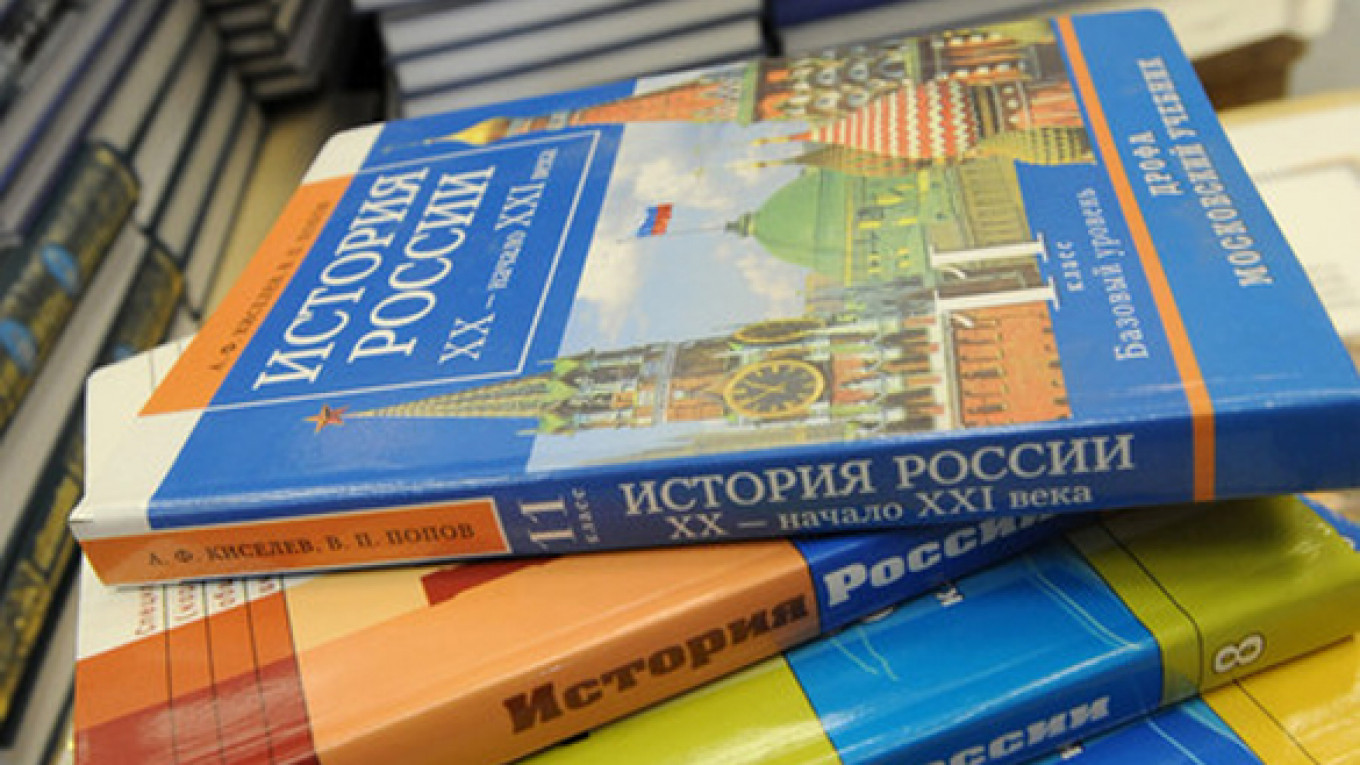Government officials, lawmakers and education officials will finalize changes to the way history is taught in schools by Nov. 1, State Duma Deputy Speaker Lyudmila Shvetsova said Wednesday outside a roundtable discussing new state textbooks.
New textbooks teaching children of various age groups a consensus opinion about historical events could appear in classrooms within 18 months, Shvetsova said.
President Vladimir Putin voiced the idea of creating new state history textbooks for all schools in February and the new teaching method has been in the works for several months.
The uniform textbooks are part of a larger push by the government to reinforce Russians' patriotism, as well as part of an attempt to overcome ethnic tensions and raise the country's profile worldwide and with its former Soviet allies.
But the initiative has been criticized by many as an attack on the freedom of speech and an attempt to fight dissent, prompting memories of ideology-riddled Soviet school books.
Shvetsova spoke of the new books as fulfilling a duty to properly guide students in learning about history.
"I believe that we must not be afraid — and somebody has to take this great responsibility — to give assessments rather than let [students] float in a sea of information, especially when it is children who have to make sense of it," Shvetsova told the roundtable.
Wednesday's roundtable included academics, lawmakers and dozens of teachers and parents from across the country who gathered to discuss the 65-page draft concept of teaching history in schools, which was published on the website of the Russian History Society in late September.
The demand for new history textbooks without "dubious interpretations" was announced by Putin in February as a measure to fight interethnic tensions, which have long been on the rise in Russia due to the country's diverse ethnic makeup.
Putin said at the time that several textbooks must be written for different classes, one for each age group, but that they must be "based on a single concept."
Shvetsova told the meeting Wednesday that she wanted the authors to raise the profile of the Soviet people's achievements, such as during World War II and in space exploration.
She conceded that "the 20th century might need to be assessed on a smaller scale since it was recent," but also lamented the assessment of a historian who said Russia "emerged a loser from the 20th century."
She said she hoped the new concept would attract attention from and be used by other former Soviet republics.
"Look at what happened in some CIS countries: quickly, and I suspect for money, they changed history books and canceled Russian language lessons," she said.
Despite large-scale public criticism of the proposed textbooks, no participant in the roundtable wholly rejected the idea of a unified concept as a whole, only disagreeing about certain parts of it.
Alexei Gusyev, a senior member of the National Parental Association and deputy head of the Moscow region education department, said parents' complaints about the draft proposal included "the lack of analysis of the Chechen wars, which are only mentioned in the context of the danger from Islamic fundamentalism" and the fact that "no place was found whatsoever to mention the mass protests of 2011 and 2012."
He added outside the meeting that others were displeased with the "mentioning of oligarchs, bandits and terrorists" after the year 2000 as opposed to focusing on ancient history.
Contact the author at [email protected]
A Message from The Moscow Times:
Dear readers,
We are facing unprecedented challenges. Russia's Prosecutor General's Office has designated The Moscow Times as an "undesirable" organization, criminalizing our work and putting our staff at risk of prosecution. This follows our earlier unjust labeling as a "foreign agent."
These actions are direct attempts to silence independent journalism in Russia. The authorities claim our work "discredits the decisions of the Russian leadership." We see things differently: we strive to provide accurate, unbiased reporting on Russia.
We, the journalists of The Moscow Times, refuse to be silenced. But to continue our work, we need your help.
Your support, no matter how small, makes a world of difference. If you can, please support us monthly starting from just $2. It's quick to set up, and every contribution makes a significant impact.
By supporting The Moscow Times, you're defending open, independent journalism in the face of repression. Thank you for standing with us.
Remind me later.






